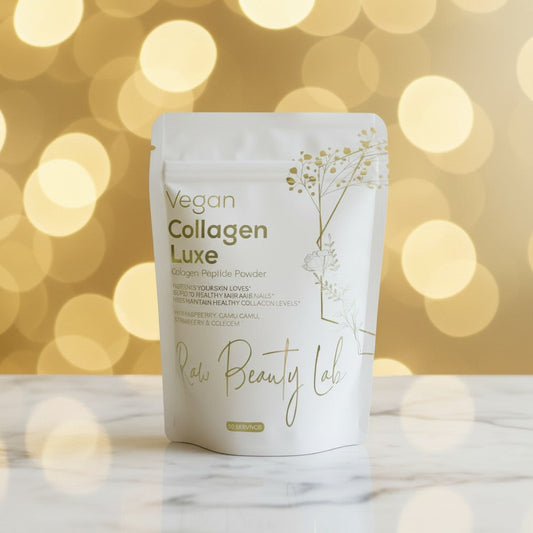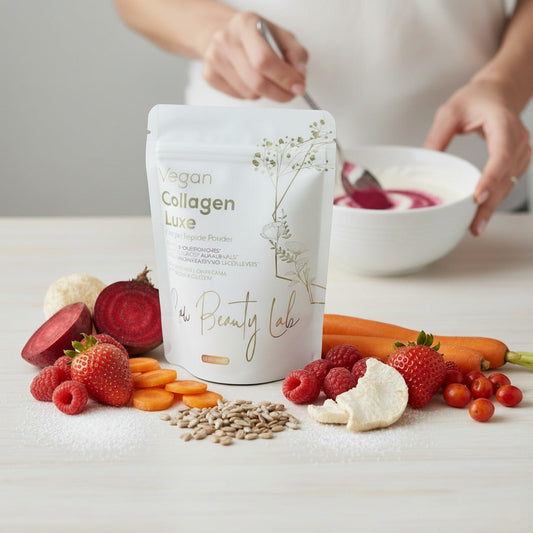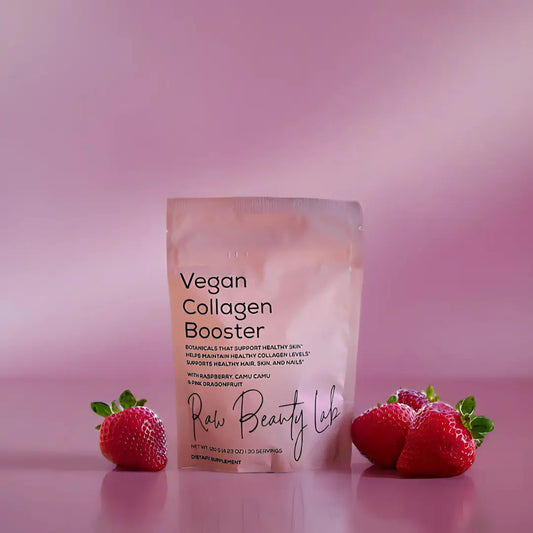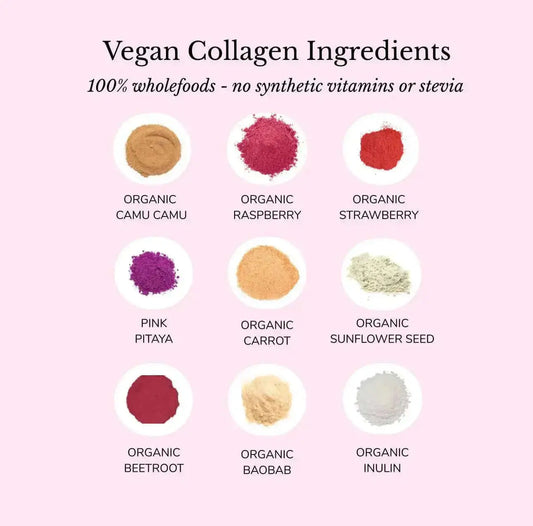Table of contents
Okay time for us to get real about sugar. Have you had some chocolate, biscuits, sweets or something else sugary today (admit it, I’m guilty too! 😳🙋)? We all know sugar is bad for us. We’ve heard it through our childhoods as we attempted to slurp coke through some red vines. But if you’ve ever stopped to consider why it’s bad for you, I’m sure you’ll think twice before reaching for another snickers bar after reading this.
Many factors can contribute to the formation of wrinkling, sagging or crepey skin, but sugar is probably one of the worst offenders – here’s how: Sugar initiates a cascade of events that cause inflammation all over your body. In the skin, this leads to the degradation of collagen and elastin fibres. Those of you familiar with this miracle protein, need no explanation as to why this is detrimental to an aging human. But for the rest of the group let me explain...
Collagen is the key to maintaining a youthful visage. It is responsible for keeping your skin firm, plump and hydrated and keeping wrinkles far from your face. Although we are capable of producing this protein, with age, our ability to produce it naturally declines. So, when you add collagen-degrading sugar to skin that’s already fighting to hold onto the collagen it does have, you are faced with the aging abhorrence – the wrinkle! It has such a destructive effect that celebrity dermatologist, Dr. Frederic Brandt, advised that giving up sugar could make you look younger by up to ten years.
Want to know more about how sugar is causing your skin to age? Keep reading to find out more!
1. Damages collagen and elastin (the stuff that keeps you looking young)
Sugar damages collagen and elastin, the springy substances that keep skin firm, lifted and elastic. It does this through a process known as glycation where digested sugar molecules attach to structural proteins such as collagen and produce Advanced Glycation End products (AGEs). This disrupts their structure, making them stiff and preventing the protein from functioning to support the elasticity and strength of your skin. Over time, this damages enough of your collagen to lead to the formation of fine lines, sagging and wrinkles. Additionally, these AGE’s can also trigger a range of signalling pathways that can cause degradation of healthy skin cells and prevent new skin cell production, resulting in thinning of the skin.
You can start to retain AGE’s as early as age 20, with a yearly accumulation of approximately 3.7% if you continue to eat a high sugar diet. Research indicated that if maintained, a high sugar diet can cause up to 50% of your total collagen to be glycated every year by the time you reach 80 years in age! Considering that the overall volume of collagen decreases with age, almost all your collagen may be glycated – causing an exponential increase in crepey, wrinkled skin as you age.
2. Deactivates anti-ageing antioxidants
In addition to damaging your skin’s essential proteins, AGEs deactivate your body’s natural antioxidant enzymes. Antioxidants are your body’s method of defending itself against free radicals produced in the skin caused by environmental assailants like pollution, blue light and UV rays. Without protection from antioxidants, your skin is more vulnerable to the free radical damage that will result in collagen and elastin degradation and consequently produce dull, tired looking skin.
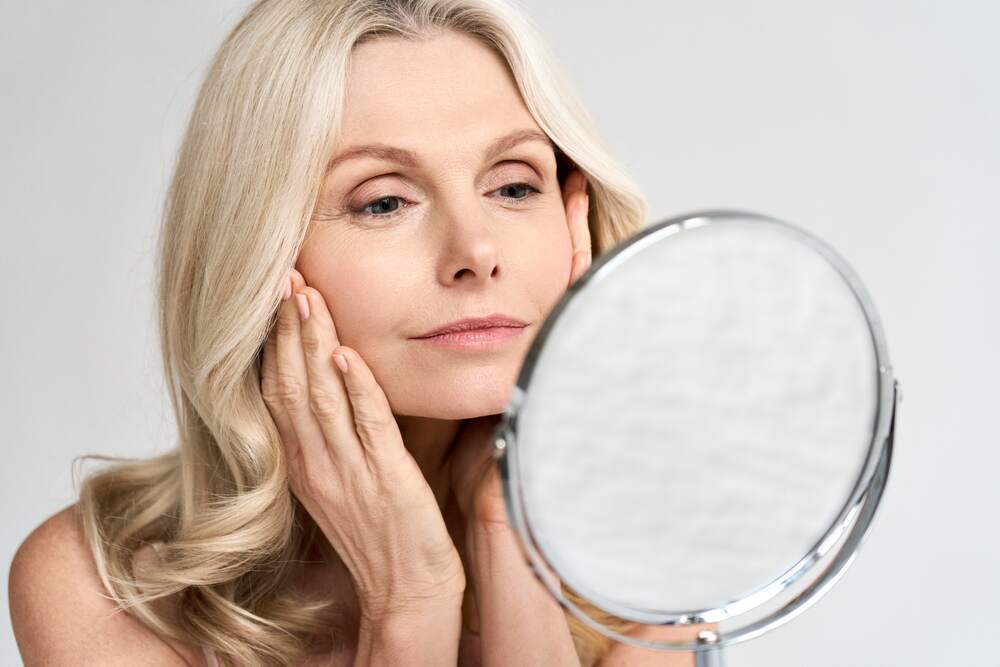
3. Hampers your natural collagen production
Sugar hinders the ability of proteins and amino acids to build collagen naturally. It essentially sticks to amino acid chains, hampering their ability to come together and produce collagen to keep the skin looking bouncy and youthful.
4. Changes the type of collagen you have
Your skin contains three types of collagen, Type I, II and III. Type I collagen is the weakest and Type III the strongest, giving your skin the most bounce and elasticity. Glycation degrades Type III collagen into Type I, thereby diminishing your skin’s structural strength and stability.
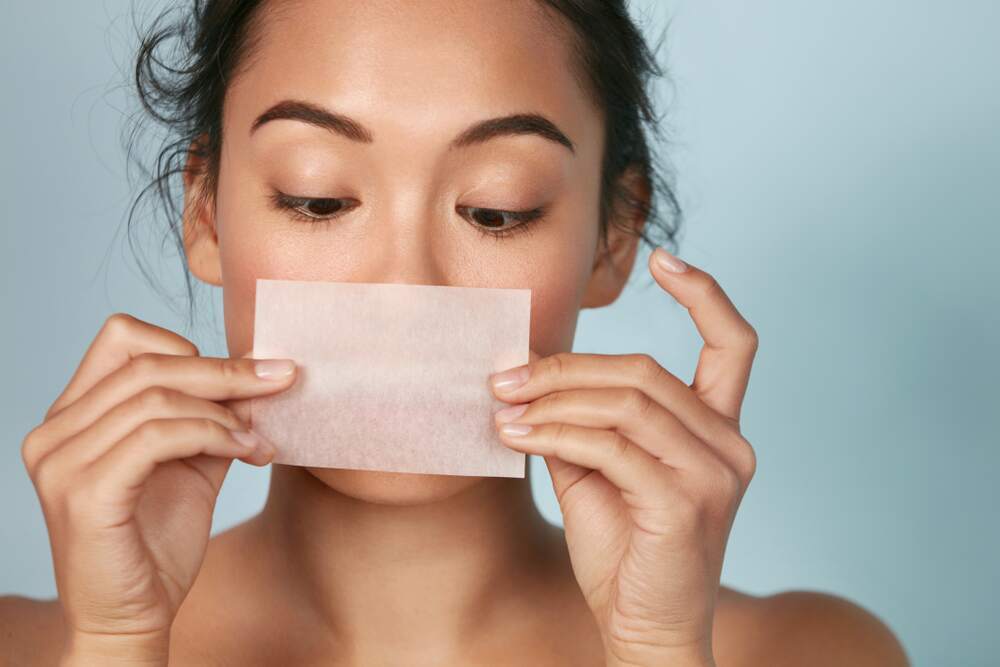
5. Gives you oily skin
An unusual little fact that you might not be aware of – sugar can dehydrate you! If you have too much sugar in your blood, your kidneys will eventually go into overdrive trying to get rid of the excess, causing you to urinate far more frequently. When this happens you end up losing fluid and dehydration is the result – never a good situation for your skin, which can become dry and brittle. It also affects water binding so your skin looks less perky and bouncy, and doesn’t appear as oxygenated.
All this sugar floating about in your bloodstream can also impact how old you look. A study conducted in the Netherlands measured the blood sugar levels of 600 participants between the ages of 50 and 70. It discovered that those with the higher blood sugar levels appeared older than those with lower blood sugar levels, concluding that for every 1 litre increase in blood sugar, your perceived age could rise by 5 months!
6. Generates inflammation
A high sugar diet can generate chronic inflammation, which not only dulls skin but can cause a range of skin conditions (including chronic acne) along with injury to organs and increase risk of disease. The AGE’s we mentioned earlier can also trigger signalling pathways that lead to inflammation in the skin. Inflammation is a natural immune response by your body to destroy pathogens – having this reaction occur in healthy skin can damage skin proteins such as collagen and elastin resulting in wrinkle formation.
How to tell if sugar is already ageing your skin
According to the British Journal of Dermatology, the visible effects of sugar-induced glycation tend to emerge for women around age 35. Your skin, unable to counteract the damage done without sufficient collagen and elastin synthesis, begins to show wear and tear. Here are the tell-tale signs on your face that sugar is the culprit aging your skin:
I have a sweet tooth - Is all sugar bad?
Unfortunately, if you want to see a visible impact on your skin, you’ll have to go all out in your efforts to reduce sugar. In other words, reducing your cupcake intake from 4 to 2 won't do much to prevent glycation, collagen destruction or inflammation. Instead, swap out the cupcakes for a piece of fruit to begin noticing tangible results. Drastically reducing your sugar intake will start to show visible results within the first 72-96 hours with better results after 28 days (when your skin cycle renews).
It’s not all bad news though. Refined and processed sugars cause the most destruction and inflammation but you're probably wondering if fruits are also on the ban list? You'll be relieved to hear that fruits are actually incredibly beneficial for your skin and are packed with beautifying antioxidants and anti-ageing phytonutrients. We'll share the best collagen-boosting fruits later in the challenge so be sure to look out for that.
But in the meantime, follow the general rule of removing heavily processed sugars from your diet – if it’s got a very long shelf life – it’s probably not got the freshest nutrients for your skin!

